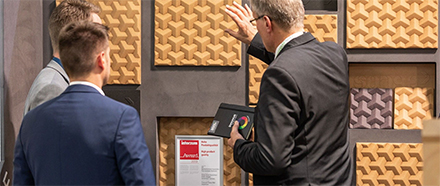 Sonae Arauco’s Three Dimensional Fiberboard (3DF) and a research project which harnessed bio technologies to create sequins from naturally abundant wood-derived cellulose have been named the winners of the TTJ Timber Innovation Award 2019. Source: Timberbiz
Sonae Arauco’s Three Dimensional Fiberboard (3DF) and a research project which harnessed bio technologies to create sequins from naturally abundant wood-derived cellulose have been named the winners of the TTJ Timber Innovation Award 2019. Source: Timberbiz
The Award, which consists of two categories: Innovative Product Development and Innovative Timber University Research, is a celebration of pioneers within the timber industry.
It highlights individuals and companies undertaking exceptional product design, and shines a spotlight on the university research performed at both undergraduate and postgraduate level in the UK – which is all too often overlooked.
The shortlisted candidates for both categories were invited to present their research or product before a panel of experienced industry leaders in July.
The winners were announced at the TTJ Awards dinner on 13 September in London.
Sonae Arauco won the Product Development category for its 3DF fiberboard, a formaldehyde-free, thermoformable composite board which can be shaped to infinite forms, densities and thicknesses under the action of pressure and temperature.
“3DF has not only created a new market for MDF, it has enabled MDF to compete with other products and materials,” Stephen Powney, TTJ said.
“It is no longer just utilitarian – 3DF boards have a high value finish, with the potential for endless forms including 3D shapes and curves. Its thermoplastic nature means it has the potential to be re-shaped, while the method through which shaping is achieved – pressing – creates no dust, and ultimately reduces the cost of the process by removing steps.”
Elissa Brunato, Central Saint Martens, and Tiffany Abitbol, RISE Material Scientist, won the Innovative Timber University Research category for their work on Bio Iridescent Sequins.
They were motivated by their desire to see alternatives to finishes and colours within the fashion and textiles Industry, ultimately creating environmentally-friendly, compostable sequins made from naturally abundant wood-derived cellulose – a redesign from the base structure up.







